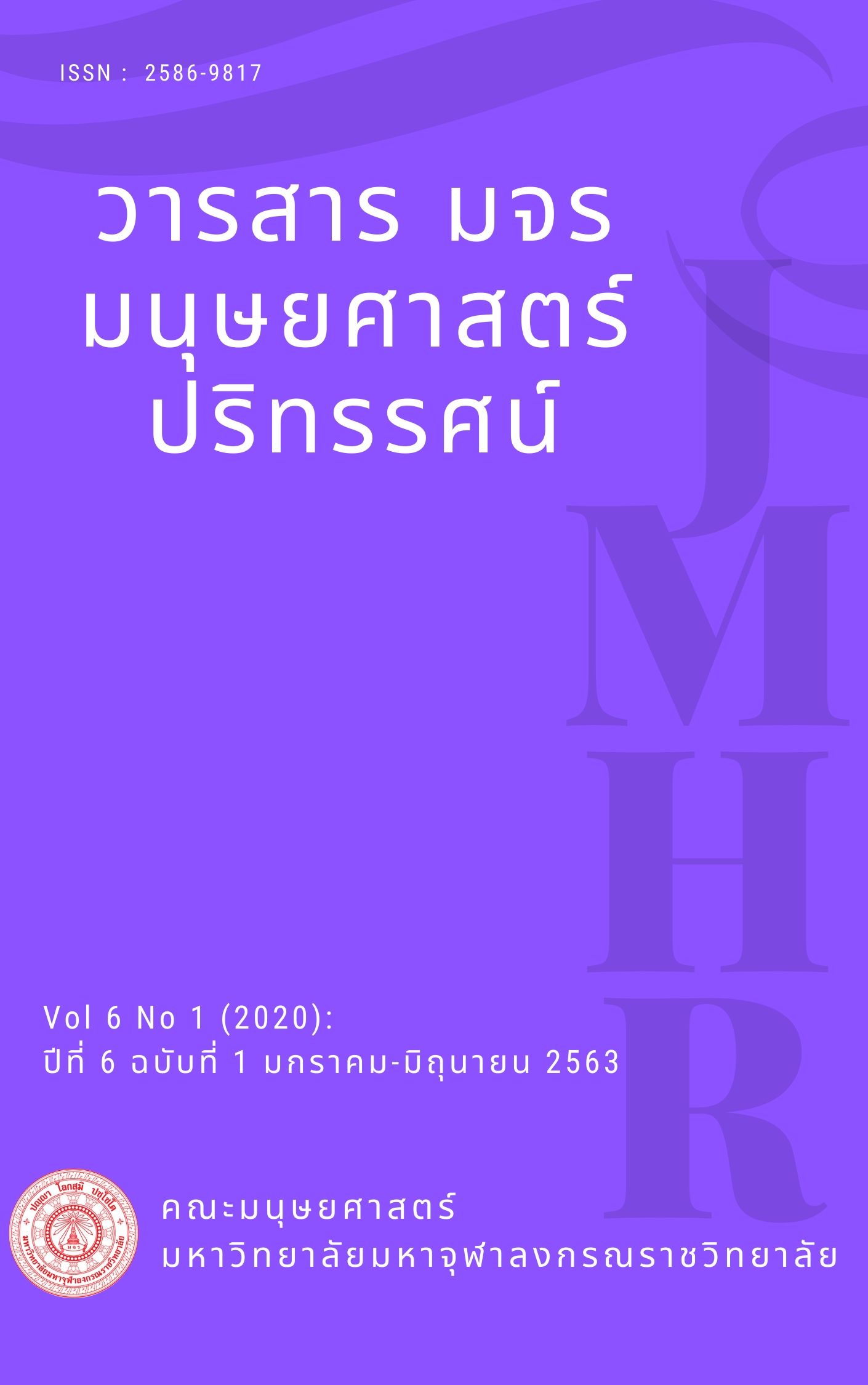การศึกษาคุณลักษณะนักขายที่ประสบความสำเร็จและมีความสุข ตามหลักพุทธจิตวิทยา
คำสำคัญ:
ึคุณลักษณะนักขาย, นักขายที่ประสบความสำเร็จและมีความสุข, พุทธจิตวิทยาบทคัดย่อ
การศึกษานี้มีวัตถุประสงค์ 1) เพื่อศึกษาคุณลักษณะนักขายที่ประสบความสำเร็จและมีความสุขตามหลักจิตวิทยาและหลักพระพุทธศาสนา 2) เพื่อวิเคราะห์องค์ประกอบของคุณลักษณะนักขายที่ประสบความสำเร็จและมีความสุขตามหลักพุทธจิตวิทยา 3) เพื่อนำเสนอคุณลักษณะนักขายที่ประสบความสำเร็จและมีความสุขตามหลักพุทธจิตวิทยา การวิจัยนี้ เป็นแบบผสานวิธีระหว่างการวิจัยเชิงคุณภาพและการวิจัยเชิงปริมาณ เครื่องมือเก็บรวบรวมข้อมูลเชิงคุณภาพใช้แบบสัมภาษณ์เชิงลึกสัมภาษณ์ผู้ให้ข้อมูลสำคัญ จำนวน 9 รูป/คน และใช้แบบสอบถามเก็บรวบรวมข้อมูลเชิงปริมาณจากกลุ่มตัวอย่างนักขายที่ทำงานในองค์กรธุรกิจเอกชน จำนวน 389 คน การวิเคราะห์ข้อมูลเชิงคุณภาพใช้การวิเคราะห์ข้อมูลเชิงเนื้อหา การวิเคราะห์ข้อมูลเชิงปริมาณใช้สถิติ ประกอบด้วย ค่าร้อยละ ค่าเฉลี่ย และค่าส่วนเบี่ยงเบนมาตรฐาน และเทคนิค Factor Analysis วิเคราะห์องค์ประกอบหรือตัวบ่งชี้ พบผลการวิจัยมีดังนี้
1. คุณลักษณะของนักขายที่ประสบความสำเร็จและมีความสุขตามหลักจิตวิทยาและหลักพระพุทธศาสนามี 3 ด้าน คือ 1) คุณลักษณะนักขายตามหลักอิทธิบาท 4 ซึ่งได้แก่ ฉันทะ วิริยะ จิตตะ วิมังสา 2) คุณลักษณะนักขายตามแนว 7 อุปนิสัยพัฒนาสู่ผู้มีประสิทธิภาพสูงสุด ซึ่งได้แก่ เป็นฝ่ายริเริ่มอยู่เสมอ เริ่มต้นการทำงานโดยมีจุดมุ่งหมายในใจอยู่เสมอ ทำตามลำดับความสำคัญเข้าใจคนอื่นก่อนจะให้คนอื่นเข้าใจเรา และ 3) คุณลักษณะนักขายทั่วไป ได้แก่ ด้านบุคลิกภาพ และด้านศิลปะการขาย
2. องค์ประกอบของคุณลักษณะนักขายที่ประสบความสำเร็จและมีความสุขตามหลักพุทธจิตวิทยา มี 5 ด้าน เรียกว่า “HAPPY Sales Concept” ประกอบด้วย 1) H - Heart เป็นคุณลักษณะและตัวบ่งชี้ ด้านความรักในอาชีพ 2) A - Absolute เป็นคุณลักษณะและตัวบ่งชี้ ด้านการทำงานทุกอย่างดุจการรวมพลังเป็นหนึ่งเดียว 3) P - Personal เป็นคุณลักษณะและตัวบ่งชี้ ด้านการเตรียมความพร้อมตนเองอยู่เสมอ 4) P - Paradigm เป็นคุณลักษณะและตัวบ่งชี้ ด้านการมองทะลุ เข้าใจทั้งตนเองและผู้อื่นก่อนเริ่มงาน และ 5) Y – Yield เป็นคุณลักษณะและตัวบ่งชี้ ด้านการพัฒนาอย่างยั่งยืน
3. คุณลักษณะนักขายที่ประสบความสำเร็จและมีความสุขตามหลักพุทธจิตวิทยา พบว่า มี 8 ประการสำคัญ โดยเรียงตามลำดับคะแนนเฉลี่ย คือ 1) บุคลิกภาพ 2) ความเพียร ความมุ่งมั่นทุ่มเท 3) คิดแบบ ชนะ/ชนะ 4) ความมีใจรัก ศรัทธาและเชื่อมั่นต่ออาชีพนักขาย 5) ใจที่จดจ่อและรับผิดชอบ 6) ทำตามลำดับความสำคัญ 7) เริ่มต้นการทำงานโดยมีจุดมุ่งหมายที่ชัดเจนอยู่ในใจ และ 8) เป็นฝ่ายริเริ่มก่อนอยู่เสมอ และการทบทวนในสิ่งที่ได้คิดและได้ทำมา
เอกสารอ้างอิง
บริษัท จัดหางาน จ๊อบส์ ดีบี (ประเทศไทย) จำกัด. (2562). 10 สายงานที่เป็นที่ต้องการในตลาดงานประจำปี 2562. สืบค้น 27 กุมภาพันธ์ 2563, จาก https://www.Telecomlover.com/2019/03/14/jobdb
วารินทร์ สินสูงสุด. (2545). ศิลปะการขาย (พิมพ์ครั้งที่ 13). กรุงเทพมหานคร: สยามมิตรการพิมพ์.
พระพรหมคุณาภรณ์ (ป.อ. ปยุตฺโต). (2549). การเพิ่มประสิทธิภาพในการทำงาน (พิมพ์ครั้งที่ 8). กรุงเทพมหานคร: สุขภาพใจ.
กิ่งแก้ว พรอภิรักษสกุล. (2560). ปัจจัยที่ส่งผลต่อประสิทธิภาพในการปฏิบัติงานของพนักงานขายของบริษัทยาในประเทศไทย (วิทยานิพนธ์บริหารธุรกิจมหาบัณฑิต สาขาวิชาการตลาด). มหาวิทยาลัยศรีปทุม. กรุงเทพฯ.






